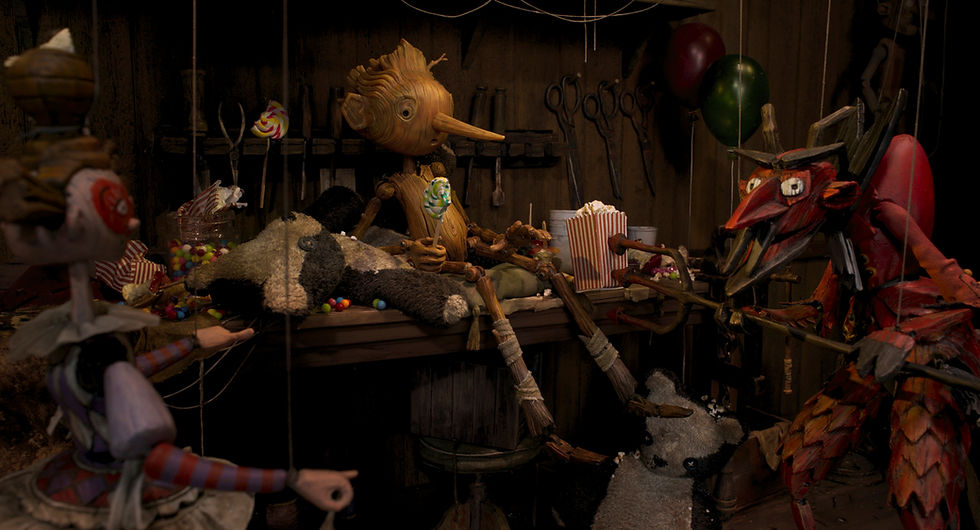"Guillermo del Toro's Pinocchio", 2022
- Nikolai Rudenko
- 13 дек. 2022 г.
- 3 мин. чтения
A Dissenting Doll: A Review of Guillermo del Toro's Pinocchio
A touching puppet musical about the bond between fathers and children, the inevitability of death and life after it.
This new adaptation of Carlo Collodi's tale transports wooden Pinocchio to 1930s Fascist Italy. To support his father Geppetto, Pinocchio decides to become a circus performer. Life makes some cruel adjustments, and soon Geppetto goes in search of his child.

Sometimes it seems fair to say that Guillermo del Toro, who has made a name for himself in reimagining horror in the last twenty years, never has a bad job or day. Considering that the process of creating a new Pinocchio has been going on since at least 2008, it's also surprising how the director has managed not to lose the imagination and energy to create one of the most emotional and visually striking animated films of recent years. The second version of the tale of the wooden boy with a growing nose for every lie in a year surpasses not only the adjacent (and bland) remake with Tom Hanks, but arguably the original Disney classic as well. Netflix's new project combines universal themes for children and adults about pain faced regardless of age, accepting death and fighting a fascist regime. It is hardly possible to imagine such a combination in any other commercial project.

Creative control and his own name in the title allowed del Toro to begin "Pinocchio" with words about non-ideal fathers and sons. Carpenter Geppetto (David Bradley) and his living son Carlo had everything and more in common. Despite their mother's absence, the two developed a beautiful kinship that was cut short when the church explosion, where Carlo had run into for a moment, occurred. The bomb had been dropped on the house of God by accident, returning from another mission. Gepetto despaired and went on a binge, never coming to terms with his loss after many years. One night, in a drunken stupor, to the sound of thunder, he creates a far from perfect replacement for Carlo in the person of Pinocchio (debutant Gregory Mann). There's a long road ahead from love to total acceptance, from domestic turmoil to the real battlefield, from death to immortality (and back again), before young Frankenstein reconciles with his heartbroken creator and realizes: things are inevitable, things that are destined to die will die anyway.

This kind of philosophy, in the history-changing year 2022, might seem to be a stone in the ocean of misery, for now there is nothing more valuable than escapist consolations. But del Toro does not sweeten the pill, making even a fairy tale a realistic reality and pain, asking to find, in the midst of horror and gloom, splinters of dignity and love. Stopping the natural course of events is beyond the power of wooden statues, human beings, reflective memoirist crickets (Ewan McGregor), and even death-defying sphinxes voiced by Tilda Swinton. Even in the belly of a bloodthirsty whale and in the midst of floating mines, there is a chance for recovery, a release, sometimes a lie to save the day.
"Pinocchio" analyzes fathers as ruthlessly painstakingly as Charlotte Wells' recent "My Sunshine," different types bringing them to a common denominator. Gepetto knows he is incapable of replacing Carlo, but he will continue to push Pinocchio emotionally, with unfortunate consequences. The local chief of staff (Ron Perlman) will send his native son (Finn Wolfhard) to a camp for young soldiers, refusing to recognize his fears. The insidious puppeteer Volpe (Christoph Waltz) uses both Pinocchio and the servant monkey Spazzatura (Cate Blanchett) for his purposes before dying, unable to transform.
At times the director, along with co-writers Mark Gustafson and Patrick McHale, flies into light didacticism, but by the finale heads off into the sunset in the most fearless, ready-for-anything way. The fantastic work of 40 animators who hand-created Italy, afterworlds and other spaces; Alexander Desplat's soundtrack, melanchologically sincere musical numbers, and references to del Toro's previous works ("Faun's Labyrinth," "Nightmare Alley") can resonate with most viewers. "Pinocchio" chooses life, gives it away, and advises us to do the same in order to preserve the remnants of humanity, the supply of which is, in fact, limitless.



Комментарии